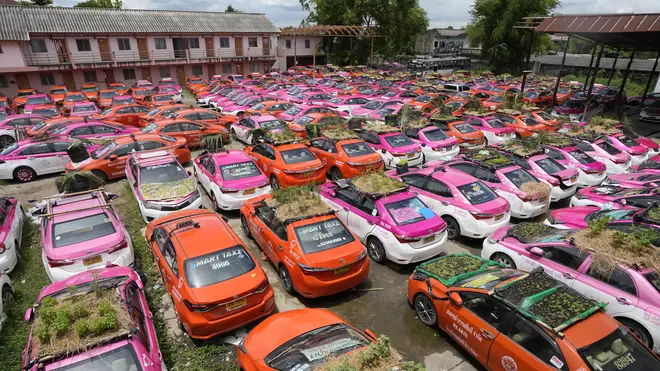
Nick Ferrari 7am - 10am
16 September 2021, 14:34

Workers from taxi co-operatives assembled the miniature gardens using plastic rubbish bags stretched across bamboo frames and filled with soil.
Taxi fleets in Thailand are giving new meaning to the term “rooftop garden”, as they utilise the roofs of cabs sat idle because of the pandemic to serve as small vegetable plots.
Workers from two taxi co-operatives assembled the miniature gardens this week using black plastic rubbish bags stretched across bamboo frames. They added soil on top and planted a variety of crops, including tomatoes, cucumbers and string beans.
The result looks more like an art installation than a car park, and this is partly the point: to draw attention to the plight of taxi drivers and operators who have been badly hit by coronavirus lockdown measures.

The Ratchapruk and Bovorn Taxi co-operatives have 500 cars left working on Bangkok’s streets, with 2,500 sitting idle at a number of city sites, according to 54-year-old executive Thapakorn Assawalertkul.
With the capital’s streets quiet until recently, there has been too much competition for too few fares, resulting in a fall in drivers’ incomes.
Many cannot now afford the daily payments on the vehicles, even after the charge was halved to 300 baht (£7), the executive said. So they have walked away, leaving the cars in long, silent rows.
Some drivers surrendered their cars and returned to their homes in rural areas when the pandemic first hit last year because they were scared, he said. More gave up and returned their cars during the second wave.

“Some left their cars at places like gas stations and called us to pick the cars up,” he recalled.
With new surges of the virus this year, the co-operatives were “completely knocked out”, as thousands of cars were given up by their drivers, he said.
Thailand’s new infections have been recorded at just under 15,000 in recent days, after peaking above 23,400 in mid-August.
The government hopes the country is easing out of this wave, which has been the deadliest so far, accounting for 97% of Thailand’s total cases and more than 99% of its deaths.
In total, Thailand has confirmed 1.4 million cases and more than 14,000 deaths.

The situation has left the taxi companies in financial peril, struggling to repay loans on the purchase of their fleets.
Ratchapruk and Bovorn co-operatives owe around two billion baht (£44 million), the executive said, with the government not so far offering any direct financial support.
“If we don’t have help soon, we will be in real trouble,” he told The Associated Press.
The taxi-top gardens do not offer an alternative revenue stream. The co-operatives’ staff, who were asked to take salary cuts, are now taking turns tending the newly made gardens.
“The vegetable garden is both an act of protest and a way to feed my staff during this tough time,” Mr Thapakorn said.
“Thailand went through political turmoil for many years, and a great flood in 2011, but business was never this terrible.”